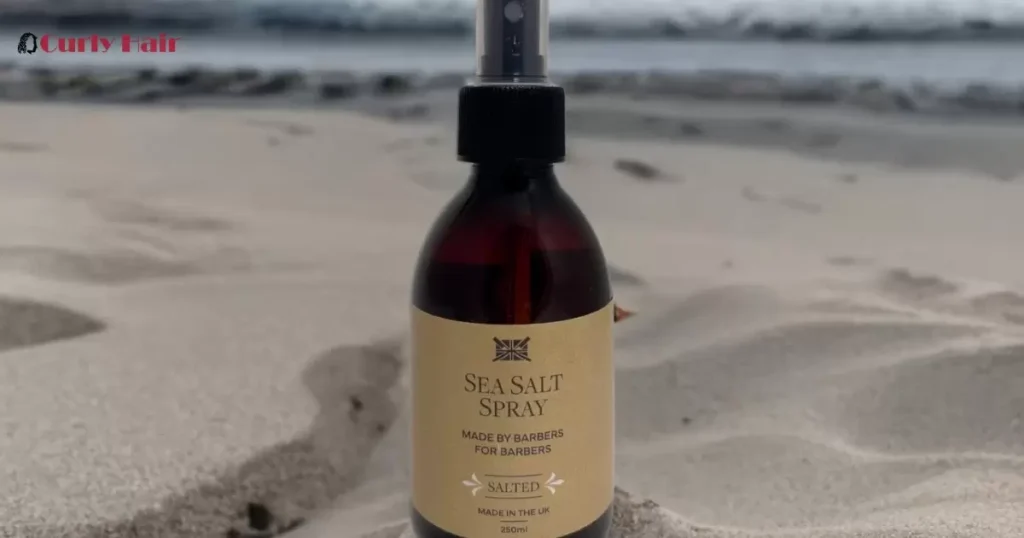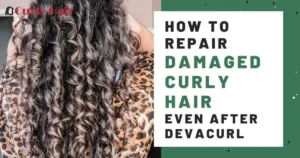Salt water can make your hair wavy, but not permanently curly. The salt dries out your hair, causing it to change shape temporarily. This effect usually disappears after washing your hair with fresh water.
Have you ever dreamed of beachy waves without a salon visit? Will salt water make your hair curly? Let’s dive into this salty secret and uncover the truth about ocean-inspired locks.
Let’s explore how salt water affects your hair and if it creates curls. We’ll look at the science behind this beach beauty hack. Stick around to learn the truth and some handy hair care tips. Ready to dive in?
Key Takeaways
- Saltwater can enhance natural curls temporarily by swelling hair strands.
- It strips natural oils, leading to dryness and potential damage without proper care.
- Regular conditioning and protective measures are essential to maintain healthy curls after exposure.
Saltwater And Your Hair Structure
| Aspect | Impact |
| Hair Cuticle | Opens up, making hair strands swell. |
| Natural Oils | Stripped away, leading to dryness. |
| Texture | Enhances natural waves and curls temporarily. |
| Maintenance | Requires regular conditioning to restore moisture and prevent damage. |
Saltwater affects hair structure by opening the hair cuticle. This makes hair strands swell. Swollen hair strands reveal the hair’s natural wave pattern. People often notice more texture in their hair after a swim in the ocean.
The minerals in salt water, like magnesium and calcium, also impact hair. These minerals can add weight to hair strands. Added weight may enhance curls or waves, giving hair a more defined texture. This change is usually temporary but noticeable, especially if you or your baby have curly hair.
Dry Hair
Saltwater can dry out hair quickly. It pulls moisture from hair strands. This makes hair feel rough and brittle. Dry hair is more prone to breakage and split ends.
Frequent exposure to saltwater can lead to long-term damage. Hair loses its natural oils and moisture. This causes it to look dull and lifeless. Regular conditioning can help mitigate these effects.
Increased Frizz And Texture
Saltwater increases frizz and texture in hair. The salt draws out moisture, leaving hair drier. Dry hair becomes more prone to frizz. The added texture can give hair a tousled, beachy look.
Disruption Of Natural Oils
Saltwater strips natural oils from your hair, leaving it dry. These oils keep hair healthy and moisturized. Without them, hair becomes brittle and prone to breakage. This makes regular conditioning essential after saltwater exposure.
Hair Type And Texture

Different hair types respond to saltwater in unique ways. Curly hair may become curlier and more defined. Straight hair might gain some waves and texture. Fine hair could appear fuller and more voluminous.
Coarse hair can become more manageable and less frizzy. The effect depends on the hair’s natural texture. Saltwater’s impact is temporary but noticeable. Regular care can maintain these changes.
Salt Water And Hair Health
Exposure to saltwater can damage your hair over time. Saltwater dries out hair, making it prone to breakage. The loss of moisture can lead to frizz and split ends.
Regular contact with salt water can also strip away hair’s natural oils. This can leave hair brittle and lifeless. To protect your hair, always rinse it after swimming in the ocean.
Is Salt Water Good Or Bad For Curly Hair?
Saltwater can enhance curls by adding texture and volume. It makes hair strands swell and reveals natural wave patterns. This can make curly hair look more defined and voluminous.
However, saltwater also dries out hair, stripping away natural oils. This can lead to brittle and damaged hair if not properly conditioned. Regular moisturizing is key to keeping curls healthy after saltwater exposure.
Tips For Protecting Your Curly Hair From Salt Water Damage

Saltwater can both enhance and harm curly hair. While it adds texture, it also strips natural oils. Proper care can help protect your hair from damage.
- Rinse your hair with fresh water before swimming.
- Apply a leave-in conditioner to protect your hair.
- Wear a swim cap to keep saltwater out.
- Use oil or serum to create a barrier on your hair.
- Wash your hair with a gentle shampoo after swimming.
- Deep condition your hair weekly to restore moisture.
- Avoid using heat styling tools on dry hair.
- Comb your hair with a wide-tooth comb to prevent breakage.
- Drink plenty of water to keep your hair hydrated from within.
What About Sea Salt Spray?
Sea salt spray is popular for creating beachy waves. It mimics the effects of saltwater on hair. The spray adds texture and volume, ideal for enhancing natural curls.
However, frequent use can dry out hair due to its salt content. It’s important to use it sparingly and follow with moisturizing products. This helps maintain healthy, hydrated curls without causing damage.
Saltwater And Curly Hair: The Science Behind It
Saltwater affects curly hair by altering its natural structure. It opens the hair cuticle, causing strands to swell and revealing curls or waves. This temporary change can make hair appear fuller and more defined after exposure.
The minerals in salt water, like magnesium and calcium, contribute to this effect. They add weight to the hair, enhancing its texture and curl pattern. Prolonged exposure without proper care can lead to dryness and brittleness in curly hair. Regular conditioning and moisturizing are crucial to maintaining healthy curls after enjoying the beach or swimming in the ocean.
Why Does Saltwater Make Our Hair Curly?

Saltwater alters the hair’s structure by opening the cuticle. This allows water to penetrate the hair shaft, causing it to swell. As the hair dries, it retains this shape, enhancing natural curls or waves.
Saltwater contains minerals like magnesium and calcium. These minerals can weigh down the hair, making curls appear more defined. The combination of swelling hair fibres and added weight from minerals gives hair a textured, curly appearance after exposure to salt and water for curly hair.
Enhancing Your Curls
Enhancing your curls with saltwater involves letting it naturally air dry. This brings out the natural texture and waves. For more defined curls, consider using a curl-enhancing product.
Avoid excessive brushing to maintain curl definition. Instead, scrunch your hair gently while it dries. This helps maintain natural volume and shape without frizz.
Does Sea Salt Spray Damage Hair?

Sea salt spray can be drying if used frequently. It contains salt that absorbs moisture from hair strands. This can lead to dryness and brittleness over time.
However, occasional use of sea salt spray can add texture and volume to hair. It enhances natural waves and gives a beachy, tousled look. To minimize potential damage, it’s important to use a hydrating conditioner after using sea salt spray.
Frequently Asked Questions
What does salt water do to curly hair?
Saltwater enhances texture and can define natural curls by opening the hair cuticle and adding volume.
Does salt sugar and water make your hair curly?
Salt, sugar, and water can enhance natural waves temporarily by altering hair texture.
How to make your hair curly with water for guys?
To enhance curls naturally, guys can try using a curl-enhancing product or twisting damp hair into curls and allowing it to air dry.
Conclusion
After exploring whether saltwater will make your hair curly, the answer is nuanced. Saltwater does enhance curls temporarily by swelling hair strands and revealing natural waves. However, it also strips away natural oils, which can lead to dryness and potential damage if not managed properly. To maintain healthy curls after swimming in saltwater, it’s crucial to rinse hair with fresh water and apply a moisturizing conditioner to restore lost moisture.
Regular conditioning helps counteract the drying effects of saltwater, keeping curls defined and healthy. Using protective products like leave-in conditioners or oils before swimming can create a barrier against salt damage. By following these tips, you can enjoy the benefits of saltwater on your curls while minimizing its potential negative effects on your hair health.











